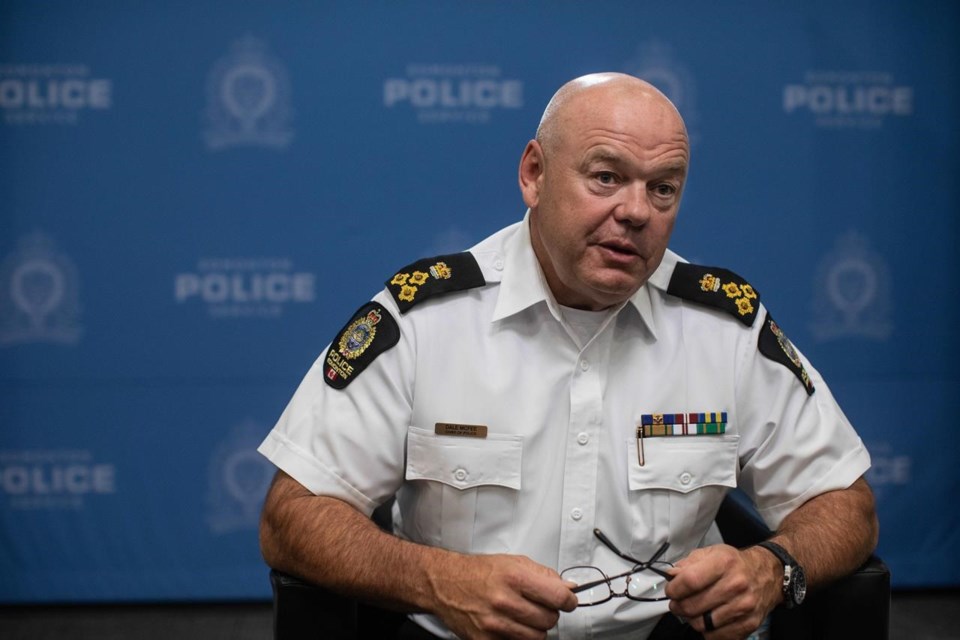EDMONTON — The police chief of Alberta's capital city stood solemnly at a podium, at moments appearing to be welling up, as he took questions from reporters about the random killing of a mother and child outside a school in May.
"I've got three daughters," said Edmonton police Chief Dale McFee as he recalled the sadness he felt that day.Â
He said he also feels frustrated that it couldn't be stopped.Â
"It's impacting everybody."
The mother and child were stabbed to death by a stranger outside Crawford Plains School. The man, who police say was known to them and had mental health issues, was shot by officers and later died in a hospital.
That tragedy, McFee said, stems from an imbalance between holding people accountable and protecting the vulnerable. Â
He believes the city was close to striking that balance between 2018 and 2021 through community partnerships that helped bring down the crime rates by 20 per cent.
"Then, all of a sudden, everything changed," he said.Â
The chief attributed it to the growing mental health crisis in the city, the effects of the COVID-19 pandemic, and criticism police forces and first responders around the world have faced since the death of George Floyd in the United States.Â
When McFee assumed his role four years ago as the head of Edmonton police, he said priority shifted to taking people with mental health problems and addictions out of the justice system and connecting them to services such as health care or rehabilitation.Â
"But at the same time, we got to hold the violent offenders accountable."Â
McFee, who is a former deputy minister of corrections and policing in Saskatchewan, said incarceration isn't always the answer. But for those who have been violent, he added, a different intervention is needed.Â
"We need to jail the people we're afraid of, not the ones we're mad at," McFee said.
Edmonton recorded its highest number of violent crimes in 2022, a police report showed, with the numbers still climbing this year.Â
Edmonton saw a jump in fatal and life-altering attacks this year — mostly random. The chief recounted a 52-year-old man from the Congo, who was the father of seven children, died in a random stabbing in July.Â
One man was sent to hospital after СŔ¶ĘÓƵ stabbed at a downtown food festival and also last month two people were arrested after allegedly shootingat random vehicles around the city.Â
The growing violence, McFee said, doesn't just affect families and communities, but also the first responders.
He said the growing frustration among police officers has prompted many to quit the service in recent months.
McFee said some officers often don't feel their work is helping keep the community safe or holding people accountable for violence.Â
He added it's equally frustrating that those who need help, such as people living in encampments across the city, often aren't connected to proper social services.Â
"The frustration comes in when you're doing it with the same person over and over and over," McFee said.Â
"Then you start to wonder, 'Wow, even as hard as we work, we can't get anywhere.'"
McFee said while officers quit the service, there remains a high demand for police visibility in various parts of the city.
"What keeps me up at night is recruiting and trying to find enough people to actually do the job to the effective standards that we want."
He said it takes at least 18 months to train recruits on how to interact with the community, and deal with violence and open drug use.
McFee said he sees people overdose in the downtown area almost every day — on and off duty — and so do many officers.Â
"It's the new reality we live in," he said.Â
Police officers have been carrying naloxone kits with them and sometimes administer it several times in a shift, McFee added.
He said he is a believer in recovery and making various harm reduction tools available to people instead of prosecuting those facing addiction problems.
"But what I can tell you is harm reduction as a single focus will never work, never has worked."
McFee said the police force has to work with the government and local groups to restore the balance.
This report by The Canadian Press was first published Aug. 5, 2023.
Ritika Dubey, The Canadian Press




